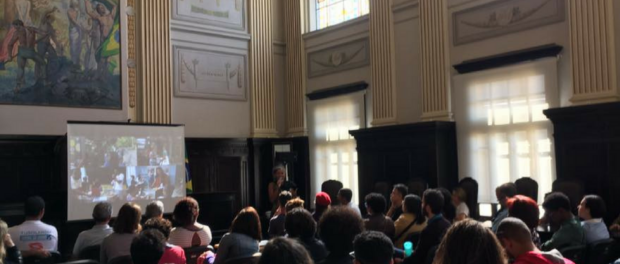
Students, professors, professionals, and civil society actors gathered last week in Rio de Janeiro for Semana Lixo Zero, or Zero Waste Week. Led by the non-profit Instituto Lixo Zero Brasil, attendees participated in discussions, presentations, and workshops over the nine-day program running from October 21 to October 30. This is the second official year that the city of Rio has organized a Zero Waste Week.
Various types of community organizations were included in Zero Waste Week. In the words of the organizers, the aim is to “promote activities that address the management of solid waste and the concept of Zero Waste in diverse segments of society.” The Rio event emphasized community-based solutions and dedicated a significant amount of time to discussing issues of waste management in favelas.
On Wednesday, October 26, Zero Waste Week held a gathering on Zero Waste Communities: Sharing Solutions at the Justice Museum. The ten presentations shared with the group of 60 attendees ranged from non-profits and community collectives to social ventures, and were all connected through their focus on promoting environmental sustainability in Rio’s favelas and peripheral neighborhoods.
Event organizer Egeu Laus began the session with an overview of trash issues in favelas. A concrete estimate of the amount of trash existing in favelas is lacking and presents a substantial barrier to designing comprehensive solutions. However, an accepted statistic by the Zero Waste Institute of Brazil is that 85 tons of waste daily are removed from Rocinha, Rio’s largest single favela.
The concept of Zero Waste in favelas is not only to serve an aesthetic purpose. Improper waste disposal in favelas can cause soil and water contamination and obstruct infrastructure. It also furthers the spread of diseases by attracting rodents; Laus cites that 60% of rats living in Rio’s favelas have been infected by leptospirosis.
Favela residents must be the principal agents of change in moving toward environmental sustainability. The ten presenting projects at Zero Waste Communities: Sharing Solutions embody this philosophy, stemming from a locally identified need and working with residents to achieve success.
In Rio das Pedras, in Rio’s West Zone, the Projeto Patrulhinha da Limpeza (Cleaning Patrol Project) models the power of community organizing. The project involves youth as community educators, patrolling the streets to prevent littering and posting public notices where garbage remains. Rio das Pedras was widely considered one of the dirtiest neighborhoods in Jacarepaguá, but the Cleaning Patrol Project has drastically reduced the amount of trash in the community.
Projeto Viva Bairro, another community project presenter at Zero Waste Communities: Sharing Solutions, works with neighborhood associations in communities including Tabajaras and Cabritos in the South Zone, and in Méier and Tijuca in the North Zone to complete projects in urban agriculture, environmental education, and artistic expression. In addition to Rio de Janeiro, Projeto Viva Bairro operates in São Paulo.
Eight other organizations were also present to speak about their work. They ranged from social collectives such as the horticulture group Planta na Rua RJ Jardinagem Social, the Eco-Store Collective–Solidarity Exchange Fair Project (Coletivo Ecoloja–Feira de Trocas Solidárias), the Pavuna Green Valley Project (Projeto Verde Vale da Pavuna), Project Recycle-Action (Projeto ReciclAção), and Project Zero Oil (Projeto Óleo Zero), to social enterprises such as CARPE Projetos Socioambientais, and civil society organizations such as the Environmental Committee of Jacarepaguá (Comissão de Meio Ambiente de Jacarepaguá) and the Guardians of Gaya Institute (Instituto Guardiões de Gaya).
The energy and constructive community solutions brought by the participants and presenters at the October 26 event bode well for the future of Rio’s favelas as increased attention is placed on developing a collaborative rather than vertical strategy and on prioritizing social impact when working to advance urban environmental sustainability.



